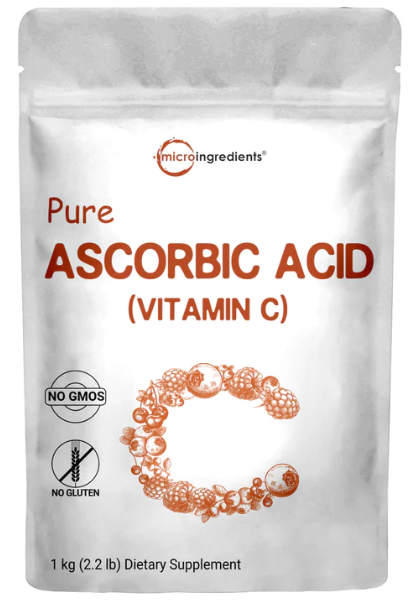Vitamin C and Immune System
Prevention is the best treatment, in my opinion. So in the hunt for supplements that can boost our immune system, I couldn’t help but think about vitamin C. Can vitamin C boost our immune system?
What is Vitamin C
Vitamin C, also known as ascorbic acid, is an essential nutrient that is important for our body to function normally. It is not something we can make on our own, so it must be taken in through our diet.
How Does it Work?
Vitamin C has been associated with several immune functions, such as helping support our epithelial barrier to keep harmful bacteria out and helping to provide antioxidants to protect the skin against environmental oxidative stress. This is why there has been a lot of interest in potentially using vitamin C to help prevent infections.
So do they help? Yes and no. It depends on your health situation.
The “Yes” Scenario
If someone doesn’t take enough vitamin C daily, vitamin C supplements can absolutely help boost immune functioning back to where it needs to be. This vitamin C deficiency might not seem common, but it’s actually the fourth leading nutrient deficiency in the United States. The body doesn’t have a lot of storage space for vitamin C, so if someone doesn’t take in vitamin C daily, this can easily lead to a deficiency.
This low storage availability of vitamin C in our body is also one of the reasons why there are some populations that daily vitamin C has shown to be beneficial in preventing infections even if they are eating enough vitamin C each day. These populations are athletes and military personnel. Both of these populations are physically demanding, and their muscles get through vitamin C storage very easily.
The last scenario is that daily vitamin C supplement implies potential benefits in preventing infection in people with metabolic disorders, such as obesity and diabetes, or cardiovascular diseases. In obese patients, the body has a lot of inflammation, and vitamin C can go in and potentially help with those inflammations. People with diabetes intrinsically have a lower level of vitamin C due to various metabolic changes in the body. A study showed that vitamin C supplementation of 1,000mg/day for eight weeks reduces fasting blood glucose and triglycerides in 64 patients. This data is still very preliminary, so it does show some promise.
The “No” Scenario
For the healthy individual who meets the daily vitamin C requirement, no solid data or recommendations support the use of vitamin C supplements.
Is vitamin C supplement safe?
Vitamin C belongs to a class of water-soluble vitamins. This means that excess vitamin C can rapidly be cleared through urine. Various research has shown that vitamin C has an excellent safety profile. That doesn’t mean that it is safe to take the entire bottle of vitamin C supplement, though!
It just means that taking a little bit more than the daily recommended amount is probably not going to hurt you. In some countries, the upper limit of vitamin C that they recommend is between 1,000-2,000 mg per day.

Is There Such a Thing as Too Much Vitamin C?
The daily recommended intake of vitamin C is different in different countries.
In the United States and Canada, the recommendation is 90 mg per day for adult men and 75mg per day for adult women. In Italy, the daily recommended amount is 105mg per day for adult men and 85mg per day for adult women.
For children and teens, the amount suggested is adjusted from the adult recommendation based on their body mass index. This means that there are different recommendations for boys and girls and differences between age groups: You can find a more completed recommendation table posted by the U.S. National Institutes of Health here.
Here are some of the recommendations for children and teens:
- Children 1-3 years: 15 mg
- Children 4-8 years: 25 mg
- Children 9-13 years: 45 mg
- Teens: 65-75 mg
Pregnant women generally need more daily vitamin C. The U.S. recommends a daily intake of 85mg per day rather than 75mg per day.
Foods High in Vitamin C
There are a lot of foods that contain high levels of vitamin C. Think of any fruits that are sour.
Citrus fruits: Oranges, lemons, limes, grapefruit
Other fruits and vegetables: Tomatoes, broccoli, cantaloupe, kale, strawberries
Supplement Tablets
There are a lot of vitamin C supplements available. I want to mention that most daily multivitamins also have vitamin C as well. If you’re looking for a standalone vitamin C supplement, you can look for a bottle that says vitamin C or ascorbic acid. Below are some of the products available on Amazon. As an Amazon Associate, I earn from qualifying purchases when you click the image.


Vitamin C Powders
You may have heard of vitamin C powders. These are ones that you can mix in water and drink. Some come as a fizzy drink, and some aren’t. There is a lot of variety. Below are some of the products available on Amazon.


Conclusion
Vitamin C is great. Vitamin C is absolutely essential in our immune function. A vitamin C deficiency has been known to cause inflammation and a higher infection rate. Because of this, if someone is deficient, they should consider adding vitamin C to their diet or vitamin C supplements. There is currently no recommendation or clear evidence for additional daily vitamin C supplements for those who are already receiving enough vitamin C. I hope this article is helpful to some of you. As usual, if you have any comments or questions, please leave your comment below. Thank you for your support.
Reference
1. Cerullo, G., Negro, M., Parimbelli, M., Pecoraro, M., Perna, S., Liguori, G., Rondanelli, M., Cena, H., & D’Antona, G. (2020). The Long History of Vitamin C: From Prevention of the Common Cold to Potential Aid in the Treatment of COVID-19. Frontiers in immunology, 11, 574029. https://doi.org/10.3389/fimmu.2020.574029
2. Bae, M., & Kim, H. (2020). Mini-Review on the Roles of Vitamin C, Vitamin D, and Selenium in the Immune System against COVID-19. Molecules (Basel, Switzerland), 25(22), 5346. https://doi.org/10.3390/molecules25225346
3. Carr, A. C., & Maggini, S. (2017). Vitamin C and Immune Function. Nutrients, 9(11), 1211. https://doi.org/10.3390/nu9111211
4. National Institutes of Health Vitamin C Fact Sheet for Consumers. https://ods.od.nih.gov/factsheets/VitaminC-Consumer





This is a great post about Vitamin C and the immune system! I always wondered how one identifies that they’re deficient in certain nutrients? Back in November 2022, I found myself getting sick multiple times back-to-back. Before getting sick, I felt healthy and fine, so I thought I didn’t have any deficiencies. But after getting sick multiple times, I began taking supplements and found my health improved significantly. What are some good way to identify vitamin deficiencies before one starts getting severely ill?
Thank you for sharing your thought! And that is a very good question. Unfortunately, a lot of times vitamin deficiency symptoms are a lot similar to other illnesses. For example, fatigue is one of the most common symptoms. This is why sometimes it can be much harder to diagnose in patients unless the patient is really deficient. As for vitamin C, if you maintain a healthy diet full of vegetables and fruits, there is a good chance that you get enough vitamin C, as well as, other vitamins in daily. Please let me know if you have more questions!